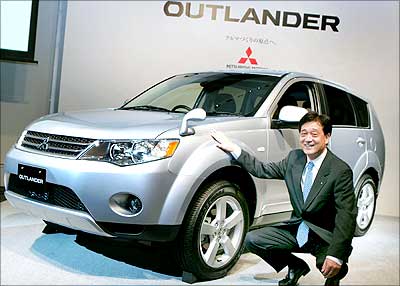Having seen Toyota and Honda take an early lead in selling cars with hybrid powerplants (the two companies began selling their first hybrid models in the late 1990s), other Japanese carmakers have been hesitant about going the same route. It would be a costly challenge against the two companies which have gained big chunks of shares in the hybrid market.
Instead, many are looking at pure electric vehicles (EVs) and as it remains uncertain what technologies are the best solution for future mobility, focusing on EVs is not necessarily a pointless move. In fact, Nissan has already made it clear that their focus be on EVs and Mitsubishi Motors is also going the same route.
"Fuel consumption and protection ofthe environment are priorities for all manufacturers and we believe that the best solution os electric vehicles, which use no fossil fuel at all," Mitsubishi Motors president Osamu Masuko told that.
Acknowledging that hybrids do have lower fuel consumption, he pointed out that they still required petrol or diesel and still generate exhaust gases:in the case of EVs, there are absolutely no toxic emissions and no dependence on oil.
Mitsubishi has actually been working on EVs since the 1970s, initially in response to air pollution. In fact, in 1971, the company supplied EVs for use by government agencies and power companies in Japan.
MMC has positioned EVs as the pinnacle of its environmental technology and the culmination of 40 years of development is the i-MiEV, an electric variant of the innovative Mitsubishi i car. This model is ready for production and will go on sale in Japan later this year and thereafter in selected markets.
The bubble shaped i-MiEV is essentially a city car as its range is 160km on a full battery charge but the good thing is that recharging can be done using a household power point.This addresses the issue that has concerned consumers - where to recharge when the battery runs low?Three modes are available and a'Quick-Charge' mode will have the battery 80% charged within 30 minutes.
EV technology is costly and even with a government subsidy, the i-MiEV will cost 3 million yen (about 33,500 USD). Mr.Masuko hopes that more carmakers will focus on developing EVs so as to advance development faster and reduce costs.
While placing emphasis on developing cars that have 0 emissions for the future, he gave assurance that Mitsubishi won't stop development of high-performance models.However, such models might not run on petrol and perhaps one day, Formula 1 might even switch to electric cars! That's certainly possible as even today, we see diesel-powered cars winning at Le Mans.
Mr.Masuko made it clear that small car will be dominant in the future and while fossil fuels are still dominant in the short term, Mitsubishi would apply the appropriate technologies for each market. In other words, where people can't afford to buy a i-MiEV, other solutions like their new diesel engine would be offered.
Like every carmaker around the globe, Mitsubishi Motors is also affected by the economic downturn but Mr.Masuko sees opportunities for change during this period.
"We should consider today's situation as an opportunities to transform our own business to a better fit for long-term viability. In order to achieve that, we are implementing immediate actions for further cost reduction and are also giving close attention in each market so that we can do everything possible in a timely and appropriate manner," he said.
Wednesday, March 4, 2009
Subscribe to:
Post Comments (Atom)















No comments:
Post a Comment